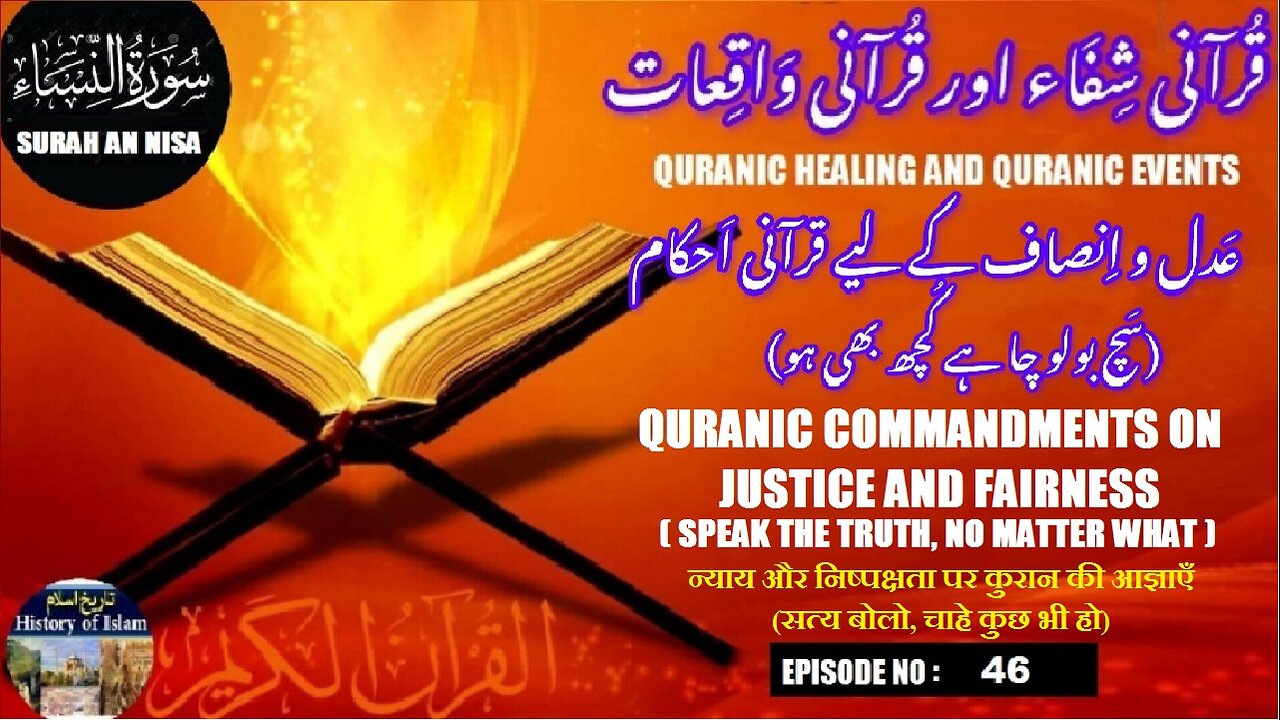Premium Only Content

Quranic Commandments (Speak the truth, no matter what) قرآنی احکام (سچ بولو چاہے کچھ بھی ہو)
@islamichistory813 #quran #bold #command #speak #the #truth #no #matter #what #healing #and #events #from #the #quran #historical #stories #and #events #quranicstories #selfhealing #success #stories #striking #events #in #history #quranstories, #stories #from #the# quran #religious #creation #stories #trending #quran #short #historical #loves #historical #heroes #what #is #true #strength #calm #quran #recitation #for #babies #islamic #healing
The Quran’s Bold Command: Speak the Truth, No Matter What.
Assalamu Alaikum, wa Rahmatullahi wa Barakatuhu.
Brothers, sisters, friends and elders, we are presenting the 46th episode of the Islamic informative video based on healing and events from the Holy Quran, and in this episode we will describe about The Quran’s Bold Command: Speak the Truth, No Matter What
Quranic Commands on Justice and Fair Dealing: Reflections on Surah An-Nisa (4:135)
Justice and fair dealing are fundamental principles in the Holy Quran and are at the heart of Islamic moral and legal teachings. Among the clearest and most powerful expressions of this concept is found in Surah An-Nisa (4:135), which commands believers to uphold justice in all circumstances, regardless of personal, familial, or social interests. The verse states: *“O you who believe! Stand out firmly for justice, as witnesses to Allah—even though it be against yourselves, or your parents, or your kin—whether it be against rich or poor, for Allah can best protect both. So do not follow your desires, lest you deviate from justice. If you distort testimony or refuse to give it, indeed, Allah is well aware of what you do.”* This verse encapsulates the Quranic ideal of justice as a sacred, unwavering duty that must be upheld above all else.
The opening address, *“O you who believe!”*, is a frequent expression in the Quran and serves to link the command of justice directly to the believer’s faith. Upholding justice is not merely a matter of good ethics or social reform; it is a sign of genuine belief in Allah. The Quran consistently teaches that faith without justice is incomplete. A believer is someone who recognizes that accountability lies not only with worldly institutions but ultimately with Allah, the All-Knowing and Most Just. In this context, to be just is to act in accordance with divine law, and to fail in justice is to fail in one's religious duty.
The verse then commands believers to be witnesses for Allah, which adds a spiritual dimension to the act of being just. This means that when a Muslim speaks the truth or delivers a judgment, they are doing so as a representative of Allah’s will on earth. Justice is not performed to please others, to avoid criticism, or to gain favor—it is a sacred testimony before the Creator. Even if justice means acknowledging one’s own mistake or testifying against a parent, sibling, or close relative, the believer is required to do so. This level of impartiality is unmatched in most legal systems, but it is a clear standard in Islam. The Quran removes all bias based on emotion, love, fear, or loyalty, and instead insists on absolute fairness. Such justice can be difficult, even painful, but it is part of the struggle for righteousness.
Moreover, the verse makes it clear that justice is not contingent upon social or economic status. Whether a person is rich or poor, the same standard of fairness must apply. In most societies, wealth and power often influence justice. The rich can afford lawyers, bribes, and influence, while the poor are frequently marginalized. Conversely, people may feel sympathy for the poor and be tempted to overlook their wrongdoing. Islam, however, transcends these biases. The Quran reminds believers that Allah is the best protector of both the rich and the poor, and that no one should be favored or disadvantaged in the pursuit of justice. This teaching seeks to establish equality before the law and protect the rights of all individuals, regardless of their worldly standing.
A particularly insightful part of the verse is the command: *“Do not follow your desires.”* The Arabic word used here, *hawa*, refers to personal inclinations, emotions, and whims that often lead people away from fairness. Whether it is greed, anger, jealousy, or fear, personal desires can cloud judgment and corrupt justice. The Quran calls on believers to exercise self-discipline and suppress these inner urges when making decisions or giving testimony. Only by overcoming personal bias can true justice be served. This aligns with the Islamic concept of *taqwa*—God-consciousness—which demands constant awareness of Allah’s presence and accountability.
The verse concludes with a warning against distorting or withholding testimony. These two actions—twisting the truth or remaining silent when one should speak—are both considered grave injustices. In many situations, justice fails not because of overt wrongdoing, but because of silence and complicity. The Quran warns that even if no one else knows, Allah is fully aware of every action, every lie, and every unspoken truth. This serves both as a deterrent for wrongdoing and a comfort to those who suffer injustice. It reinforces the belief that divine justice is absolute, and nothing escapes Allah’s knowledge.
In summary, the Quranic command in Surah An-Nisa (4:135) presents a complete and timeless framework for justice and fair dealing. It calls for moral courage, honesty, and the willingness to stand for truth—even when it is difficult or unpopular. It challenges believers to rise above personal bias and emotional influence and to treat all people—rich or poor, friend or foe—with fairness. Justice in Islam is not just a social or legal requirement; it is an act of worship and a reflection of faith. When Muslims uphold justice in their families, communities, and nations, they fulfill a central aspect of their relationship with Allah. In a world often plagued by injustice, this divine standard offers a clear and unwavering path to peace, dignity, and righteousness.
With this, we ask for your permission until tomorrow and pray to Allah Almighty to grant us the ability to act on the Quran and Hadith, Amen
Allah Hafiz
============================
-
 18:28
18:28
ISLAMIC HISTORY
1 day agoRabi-ul-Awwal Special Biography of Prophet Muhammad (PBUH) Part-3 سیرت نبوی صلی اللہ علیہ وسلم
1 -
 46:18
46:18
SB Mowing
2 days agoShe was LOSING HOPE but this SURPRISE CHANGED EVERYTHING
37K42 -
 10:00:10
10:00:10
ItsLancOfficial
10 hours agoWE LIVE 🔴WE LIVE 🔴 SUNDAY SUNDAYS!!!!!!! TARKOV
34.9K1 -
 4:09:32
4:09:32
EricJohnPizzaArtist
6 days agoAwesome Sauce PIZZA ART LIVE Ep. #59: Are You Ready for some FOOTBALL with GameOn!
40.7K7 -
 1:21:43
1:21:43
Jake Shields' Fight Back Podcast
16 hours agoJake Shields and Paul Miller!
73.7K125 -
 1:20:41
1:20:41
TRAGIKxGHOST
7 hours agoTrying to get SCARED tonight! | Are You SCARED!? | Screams Beyond Midnight | Grab a Snack
27K5 -
 5:21:24
5:21:24
StuffCentral
9 hours agoI'm baaack (no you can't play with me.. unless you a healer)
26.9K6 -
 2:25:11
2:25:11
TheSaltyCracker
11 hours agoTrump Is Not Dead ReEEeStream 8-31-25
106K151 -
 3:09:16
3:09:16
THOUGHTCAST With Jeff D.
9 hours ago $5.54 earnedLabor Day Weekend FORTNITE With THOUGHTCAST Jeff & the squad
28K4 -
 3:44:05
3:44:05
Rallied
11 hours ago $6.78 earnedSolo Challenges All Day
51.2K1